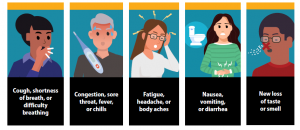What are coronaviruses?
Coronaviruses (CoVs) are large family of viruses that usually cause mild to moderate upper-respiratory tract illnesses in humans, like the common cold. These are considered common human coronaviruses. Coronaviruses are also found in animals and can rarely spread from animals to humans, causing more serious and fatal disease in humans, such as Middle East Respiratory Syndrome coronavirus (MERS-CoV) or Severe Acute Respiratory Syndrome (SARS)
About COVID-19
COVID-19 (coronavirus disease 2019) is an infectious respiratory disease caused by coronavirus a named SARS-CoV-2, a part of the coronavirus family. COVID-19 was first discovered in December 2019 in Wuhan, China. On January 30, 2020, the International Health Regulations Emergency Committee (IHR EC) of the World Health Organization (WHO) declared the outbreak a “public health emergency of international concern” (PHEIC), the WHO’s highest level of alarm. On January 31, 2020, Health and Human Services Secretary Alex M. Azar II declared a public health emergency (PHE) for the United States to aid the nation’s healthcare community in responding to COVID-19. Since then, the virus has rapidly spread throughout the world, with hundreds of millions confirmed cases and over 6 million deaths worldwide.
For more information, visit the Centers for Disease Control and Prevention (CDC) COVID-19 website.
How does COVID-19 spread?
COVID-19 spreads when an infected person breathes out droplets and very small particles that contain the virus. These droplets and particles can be breathed in by other people or land on their eyes, noses, or mouth. In some circumstances, they may contaminate surfaces they touch. Learn more on how to protect yourself and others.
Symptoms of COVID-19

COVID-19 most often causes respiratory symptoms ranging from mild to very severe, such as fever or chills, cough, shortness of breath or difficulty breathing, fatigue, muscle or body aches, headache, new loss of taste or smell, sore throat, congestion or runny nose, diarrhea, nausea or vomiting.
Most people with COVID-19 have mild symptoms, but some people who have certain medical conditions or are immunocompromised can become severely ill.
Anyone infected with COVID-19 can spread it, even if they do NOT have symptoms.
Learn more about symptoms of COVID-19.
Prevention of COVID-19

There are many ways your actions can help protect you, your household, and your community from severe illness from COVID-19.
Vaccines for COVID-19 help your body develop protection from the virus that causes COVID-19. If you are moderately or severely immunocompromised, there are different recommendations for COVID-19 vaccines. Although vaccinated people sometimes get infected with the virus that causes COVID-19, staying up to date on COVID-19 vaccines significantly lowers the risk of getting very sick, being hospitalized, or dying from COVID-19.
Wearing a mask well-fitting mask can help protect you and others from COVID-19. Masks are made to contain droplets and particles that you breathe, cough, or sneeze out. A variety of masks are available. Some masks provide a higher level of protection than others. Learn more about masks.
Handwashing is one of the best ways to protect yourself and your family from getting sick. Learn when and how to wash your hands to stay healthy.
Learn more about prevention and how to protect yourself and others.
What to do if you are feeling sick
If you have signs and symptoms of COVID-19, there are testing and COVID-19 treatment and medication options. It is important to note the signs and symptoms of COVID-19 are similar to other infectious diseases and you cannot tell the difference by symptoms alone, thus it is important to specifically test for COVID-19 and other respiratory viruses to help you decide what to do next to reduce your risk of severe illness and lower the changes of spreading a virus to others.
If you were exposed to COVID-19, use prevention strategies to protect yourself and others.
What to do if you test positive for COVID-19?
If you have COVID-19, there are steps you can take to protect yourself and others. Isolation is no longer required, but it is recommended to stay home and away from others If you are sick. You can go back to your normal activities if your symptoms are improving and you are fever free for 24 hours without the use of fever-reducing medication. It is also recommended to take additional precautions for the next 5 days. Learn more about precautions and preventing spread of respiratory viruses when you are sick.
Seek medical attention, including starting treatment for COVID-19 as appropriate. Please call your medical provider for any other symptoms that are severe or concerning to you.
Long COVID or Post-COVID Conditions
Some people who have been infected with the virus that causes COVID-19 can experience long-term effects from their infection, known as post-COVID conditions (PCC) or long COVID.
Post-COVID conditions can include a wide range of ongoing health problems; these conditions can last weeks, months, or years.
Learn more about long COVID or post-COVID conditions. Please call your medical provider for any other symptoms that are severe or concerning to you.
Do you need a free COVID testing kit? MCPHD will be offering at-home COVID-19 test kits with extended use dates on Tuesday’s and Thursday’s while supplies last. A maximum of 10 per family are available. Pick up will be at Montgomery County Public Health District located at 1300 South Loop 336 West, Conroe, 77304. Please call Lisa at 936-537-9751 to request kits. You can email Lisa at lgarman@mchd-tx.org.